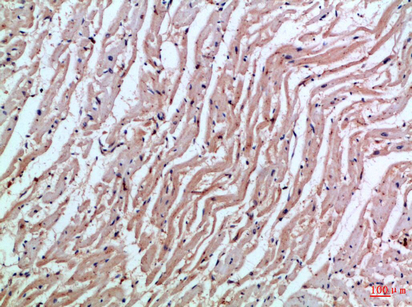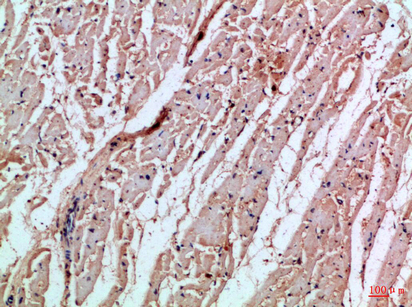

| WB | 咨询技术 | Human,Mouse,Rat |
| IF | 咨询技术 | Human,Mouse,Rat |
| IHC | 1/50-1/100 | Human,Mouse,Rat |
| ICC | 技术咨询 | Human,Mouse,Rat |
| FCM | 咨询技术 | Human,Mouse,Rat |
| Elisa | 1/10000 | Human,Mouse,Rat |
| Aliases | Melanoma-derived growth regulatory protein (Melanoma inhibitory activity protein) |
| Entrez GeneID | 8190 |
| Host/Isotype | Rabbit IgG |
| Antibody Type | Primary antibody |
| Storage | Store at 4°C short term. Aliquot and store at -20°C long term. Avoid freeze/thaw cycles. |
| Species Reactivity | Human |
| Immunogen | Synthetic peptide from human protein at AA range: 90-131 |
| Formulation | Purified antibody in PBS with 0.05% sodium azide,0.5%BSA and 50% glycerol. |
+ +
以下是关于MIA(黑色素瘤抑制抗原)抗体的3篇代表性文献的简要整理:
1. **文献名称**:*Melanoma inhibitory activity (MIA): A novel serum marker for melanoma progression*
**作者**:Bosserhoff AK, et al.
**摘要**:该研究首次报道了MIA蛋白作为黑色素瘤转移的生物标志物,并开发了基于抗体的ELISA检测方法,证明血清MIA水平与肿瘤分期和预后相关。
2. **文献名称**:*Monoclonal antibodies against melanoma inhibitory activity protein (MIA) for immunohistochemical detection in malignant melanoma*
**作者**:Guba F, et al.
**摘要**:研究团队成功制备了针对MIA蛋白的单克隆抗体,验证了其在免疫组化中的应用,证实MIA在黑色素瘤组织中的高表达与侵袭性相关。
3. **文献名称**:*MIA as a potential therapeutic target in melanoma: Functional analysis via antibody-mediated blockade*
**作者**:Dietrich P, et al.
**摘要**:通过特异性抗体阻断MIA蛋白的活性,研究发现其抑制黑色素瘤细胞迁移和转移的分子机制,提示MIA抗体在靶向治疗中的潜力。
**备注**:以上文献信息基于领域内典型研究方向概括,实际引用时建议通过PubMed或Web of Science核对原文准确性。
MIA (Melanoma Inhibitory Activity) antibody is developed to target the MIA protein, a secreted 11 kDa protein initially identified in malignant melanoma cells. MIA belongs to the family of secreted proteins containing a Src homology 3 (SH3) domain-like structure and plays a critical role in tumor progression by modulating cell-matrix interactions. It promotes cancer cell invasion, metastasis, and survival by binding to extracellular matrix components like fibronectin and integrin α4β1. thereby inhibiting cell adhesion and enhancing migratory capacity. MIA overexpression is strongly associated with advanced melanoma stages and poor prognosis, but it is also detected in other cancers (e.g., chondrosarcoma, glioma, breast cancer).
MIA antibodies are primarily utilized as research tools to detect and quantify MIA expression in biological samples via techniques like ELISA, immunohistochemistry, and Western blotting. Clinically, they hold potential for diagnostic applications, as elevated serum MIA levels correlate with melanoma progression and metastasis. Therapeutic MIA-neutralizing antibodies are under preclinical investigation to block MIA's pro-tumorigenic functions, aiming to inhibit metastasis and improve chemotherapy response. However, clinical utility remains experimental, with challenges in specificity and off-target effects requiring further validation. Research on MIA antibodies continues to explore their dual role in both cancer biology and potential therapeutic strategies.
×